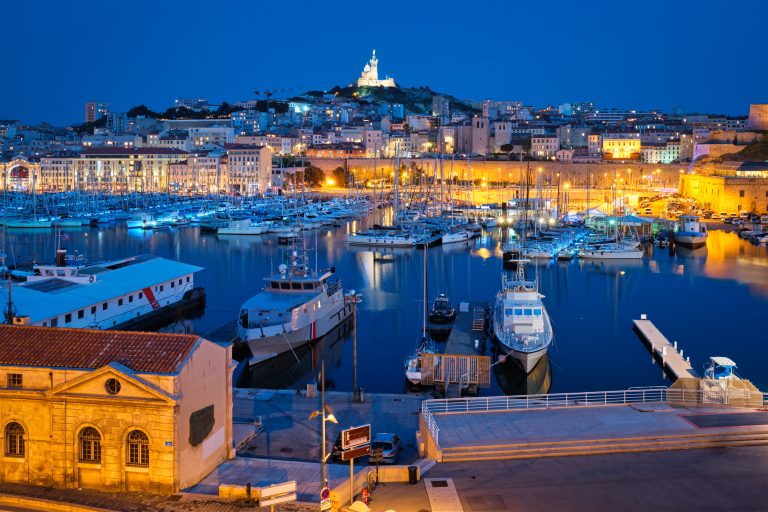Marseille: A strong commitment to energy and social transition
Marseille is positioning itself as a pioneering city for energy and social transition in the Mediterranean. Faced with the challenges of climate change, social inequalities, and energy poverty, the Municipality is deploying an ambitious strategy rooted in its City Climate Contract.
As a major accomplishment in the climate direction, Marseille was selected among the 100 Cities of the program Climate Neutral and Smart Cities by 2030 of the European Commission. This program supports 100 European cities in their transformation towards climate neutrality by 2030 and make them hubs for experimentation and innovation for all cities. The City of Marseille launched its plan Marseille 2030 Objectif Climat, which aims to build a vision of a climate neutral Marseille, through several public policies. A multilevel governance installed in September 2022 coordinating thematic committees and a scientific committee.
Towards a sustainable future: Marseille’s innovative projects for an inclusive transition

A comprehensive commitment backed by the City Climate Contract
The City Climate Contract is based on close collaboration between the municipality, economic and associative stakeholders, and residents to accelerate the necessary transformations. This contract forms the foundation of a comprehensive policy organized around several priorities:
- Building a vision for a decarbonized and climate-resilient Marseille that envisions the necessary transformations to achieve this goal,
- Supporting and showcasing Marseille-based stakeholders driving these transformations,
- Engaging citizens in shaping this transition,
- Accelerating the deployment of high-impact climate projects across Marseille, leveraging local, national, and European financial tools.
In this context, Marseille is committed to decarbonizing its building stock by addressing energy poverty and substandard housing. It aims to enhance energy sobriety, efficiency, and the use of renewable energies while actively addressing energy exclusion. Vulnerable populations, often the first victims of climate change, are at the heart of these actions. The implementation of the City Climate Contract is further supported by cross-cutting policies that aim to sustain ecological transition while improving the quality of life for Marseille’s residents. These include energy renovations in schools, reducing the carbon footprint of cultural facilities, and waste management.
Concrete initiatives for a sustainable transition
To bring this ambition to life, Marseille is implementing innovative projects that combine energy sobriety, social inclusion, and technological innovation. Among them, the European project POSEIDON stands out by transforming existing neighborhoods into Positive Energy Districts. These areas, designed to be carbon-neutral and produce more energy than they consume, represent a model for a sustainable and resilient city.
In the Chartreux district, the experiment conducted as part of the Zero Energy Exclusion Territories initiative directly addresses energy poverty. This program supports 280 low-income homeowners in renovating their homes. It provides financial, technical, and administrative assistance to make renovation processes accessible while reducing energy bills, CO2 emissions, and improving the quality of life for residents.
At the same time, the OTTER LIFE project aims to simplify energy renovations for individuals. Through a one-stop digital platform, homeowners and co-owners can access tailored financing solutions and receive clear guidance, strengthening their confidence in renovation work.
Finally, with the BanPER LIFE project, Marseille is exploring innovative private financing mechanisms to scale up housing renovations, particularly targeting households in energy poverty.
A tailored response to mediterranean challenges
As a port city in the Mediterranean, Marseille faces specific challenges related to climate change, such as rising temperatures, sea level rise, and rapid urbanization. These realities are considered in the design of public policies, making the city a laboratory of innovation for the region.
Marseille’s approach relies on participatory methods that involve citizens in the definition and implementation of projects. Consultations carried out as part of the City Climate Contract strengthen local engagement, essential to ensuring the success of the transitions underway.
Local ambition with international reach
Marseille represents a city in motion, ready to tackle the challenges of the 21st century and chart a path toward a sustainable future, not only for its citizens but also for other Mediterranean cities facing similar challenges.
Thus, Marseille establishes itself as a true innovation hub for energy and social transition in the Mediterranean. Through pioneering projects like POSEIDON, the city goes beyond adopting innovative technical solutions by placing social issues at the core of its development. By transforming neighborhoods into Positive Energy Districts, POSEIDON embodies a future model where citizens are at the heart of change, becoming active participants in a sustainable and inclusive transition. This project, at the crossroads of energy, innovation, and social engagement, demonstrates Marseille’s determination to pave the way for a greener, fairer, and more resilient future.
